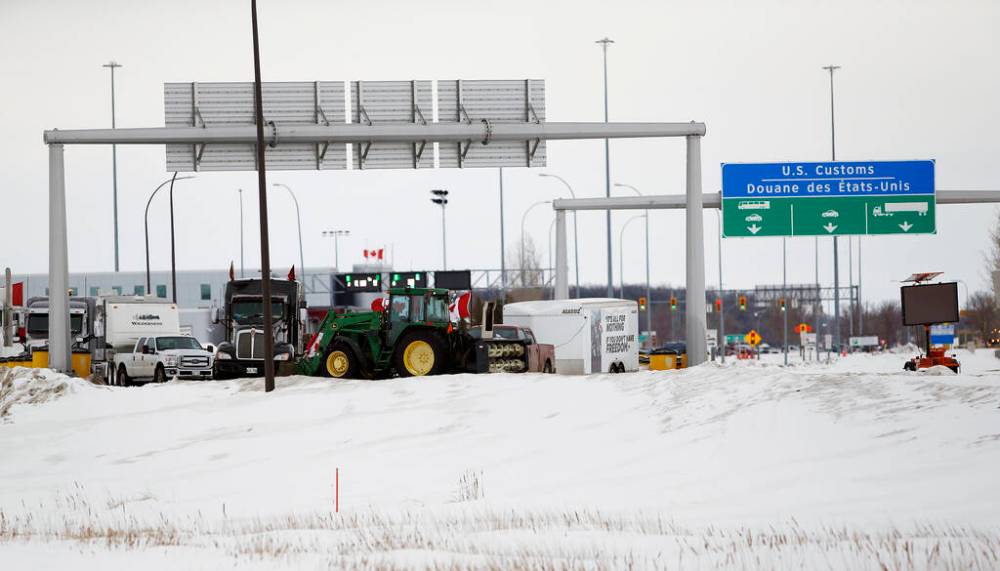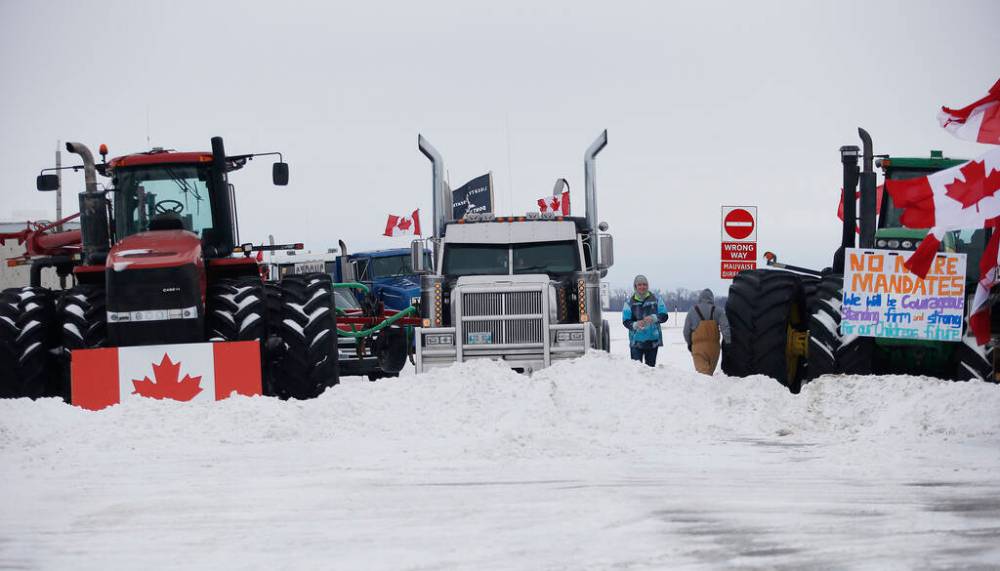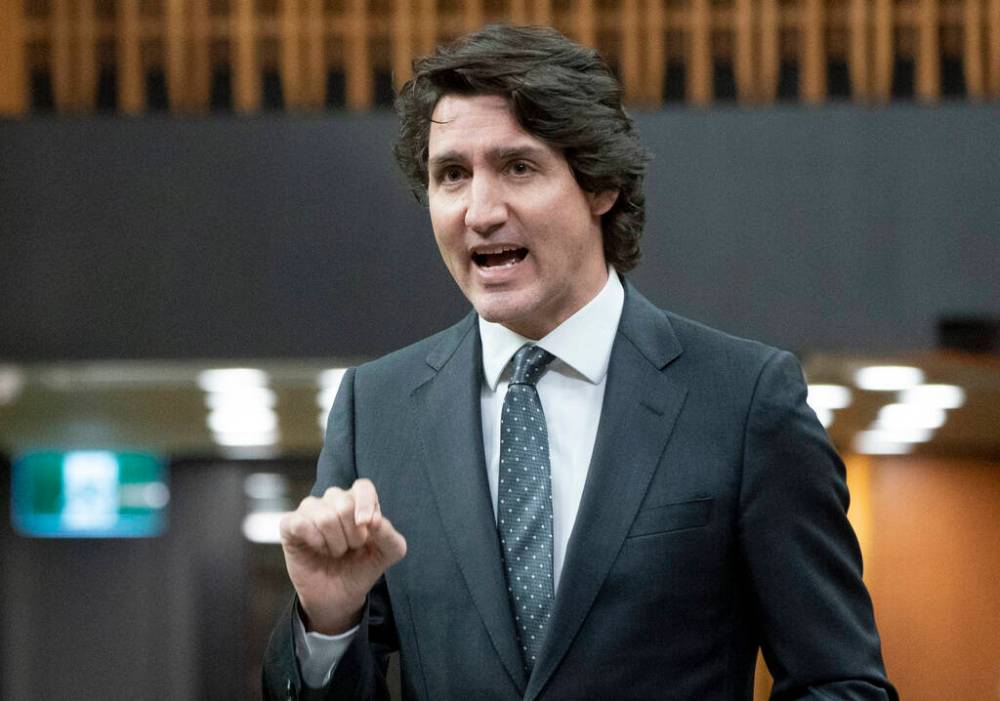‘Complete circus’ blockade at Emerson border crossing to end
Advertisement
Read this article for free:
or
Already have an account? Log in here »
To continue reading, please subscribe:
Monthly Digital Subscription
$0 for the first 4 weeks*
- Enjoy unlimited reading on winnipegfreepress.com
- Read the E-Edition, our digital replica newspaper
- Access News Break, our award-winning app
- Play interactive puzzles
*No charge for 4 weeks then price increases to the regular rate of $19.00 plus GST every four weeks. Offer available to new and qualified returning subscribers only. Cancel any time.
Monthly Digital Subscription
$4.75/week*
- Enjoy unlimited reading on winnipegfreepress.com
- Read the E-Edition, our digital replica newspaper
- Access News Break, our award-winning app
- Play interactive puzzles
*Billed as $19 plus GST every four weeks. Cancel any time.
To continue reading, please subscribe:
Add Free Press access to your Brandon Sun subscription for only an additional
$1 for the first 4 weeks*
*Your next subscription payment will increase by $1.00 and you will be charged $16.99 plus GST for four weeks. After four weeks, your payment will increase to $23.99 plus GST every four weeks.
Read unlimited articles for free today:
or
Already have an account? Log in here »
Hey there, time traveller!
This article was published 15/02/2022 (1395 days ago), so information in it may no longer be current.
Protesters in semis and tractors have promised to release their chokehold on Manitoba’s busiest border crossing after almost a week over their insistence mask and vaccine mandates be removed immediately.
RCMP announced Tuesday afternoon they had brokered a deal with protesters that will see them dismantle the blockade on Highway 75 just north of the U.S. border crossing near Emerson, south of Winnipeg.
“We are now confident that a resolution has been reached and that demonstrators will soon be leaving the area and that full access to the Emerson Port of Entry will be restored,” RCMP Chief Supt. Rob Hill said Tuesday.

About 40 to 60 semis, tractors and other vehicles choked off Manitoba’s main cross-border trade corridor starting Thursday morning. They prevented an estimated $73-million worth of goods from being shipped through the port of entry each day. Truckers had to take detours to cross the border elsewhere. RCMP said officers are co-ordinating the departure of those blocking access to the border who were expected to be gone by Wednesday.
Emerson Duty Free Shop co-owner Simon Resch said he was relieved to see the “complete circus” prepare to pack up and leave. He estimated it cost him 100 per cent of his business for nearly a week.
That meant losing “thousands and thousands of dollars every day.” It was a huge blow after two years of bringing in about 20 per cent of pre-pandemic business thanks to the pandemic.
He likened witnessing the blockade to being in a different country, though he noted the RCMP’s consistent response to a potentially volatile situation lowered the temperature of the demonstration.
“I never thought that would happen in my backyard and particularly by a group of motivated, minority-opinion holders honking their horns and running around waving pro-Donald Trump flags and ‘let’s go Brandon’ placards (a coded anti-U.S. President Joe Biden phrase),” said Resch, whose family has run the shop for four decades.
He said his industry has been devastated by the pandemic, and he initially saw good messages of unity between Canada and the United States from the slow-roll protests that began a few weeks ago.
“Then all of a sudden last week, this sort of radical element just decided ‘OK, enough’s enough, let’s shut it all down now.’ You do that when you’re three (years old), not when you’re an adult and not at a border crossing that affects the country,” he said.
The withdrawal of the illegal blockade was announced after the federal government invoked the federal Emergencies Act Monday. The move signalled a clampdown on the siege at the border, including in Alberta, B.C. and Ontario. Owners of the vehicles that were illegally blocking the roadway were warned their bank accounts could be frozen and their insurance revoked.

Resch said he was glad to see the federal government take firm action. He was confused when Premier Heather Stefanson said she didn’t want to see the power of the federal Emergencies Act used to put an end to the border blockade at Emerson.
On Monday, the premier cautioned against its use in Manitoba, where she said enforcement of the federal law with broad and sweeping powers could escalate the tense situation. Stefanson called on the federal government to develop a plan for the border and blamed Ottawa for imposing a vaccine mandate for truckers that ignited demonstrations across the country. Manitobans, she said, should trust that law enforcement could resolve the blockade at the Emerson border “through peaceful negotiations.”
Resch hopes the blockade will be dispersed by the time he drives to his shop Wednesday morning.
Legal authorities say the province didn’t have to wait for the federal government to act.
“The police can arrest anyone committing a crime and take other steps to enforce traffic regulations — which blocking the road presumably would run afoul of,” said University of Manitoba assistant law professor Gerard Kennedy.
“No orders-in-council or invocations of emergency legislation are necessary to do that,” he said.
Associate Professor in the Applied Disaster and Emergency Studies (ADES) department at Brandon University, Jack Lindsay, said Manitobans are used to having some freedoms curtailed during emergencies such as blizzards that prompt the RCMP to shut down highways. Manitoba has its own far-reaching Emergency Measures Act that was used during the pandemic, as well as during wildfires and floods to order evacuations, and could be used again to move protesters that occupy roadways.
“Unlike Ontario, Manitoba and most other provinces can require a person to perform a service they’re able to provide,” Lindsau said. “We could be ordering tow-truck drivers or others to help take down a blockade,” whereas Ontario’s legislation specifically says it cannot require a person to do something, he said.

Manitobans are not used to seeing laws enforced to deal with a civil disturbance like a blockade at the border, said Lindsay.
“Province by province, it’s going to be a political calculation as to whether or not different premiers of different political stripes want to be seen as tough on protesters or soft on protesters,” Lindsay said. He said to look out for inconsistencies.
“These powers are meant to be applied without any reference to age, gender, ethnicity or language,” Lindsay said.
Nomi Claire Lazar, a University of Ottawa professor who specializes in how governments use states of emergency, said the federal government could make unilateral decisions in how to use the Emergencies Act in Manitoba.
Lazar said Prime Minister Justin Trudeau had to consult with premiers, and did so, but does not require their consent to act within a province, because it’s been deemed a national emergency.
Yet Lazar said the most impact from the federal Emergencies Act could be the thinning out of convoy activists as their funding dries up. Trudeau has moved to freeze the assets of truck owners and bank accounts handling donations.
“Provincial powers do not allow for that kind of financial consequence,” she said. “It’s in cyberspace, rather than any actual physical space.”
Lazar noted this is the first time the Emergencies Act has been invoked since it became law in 1988 when it replaced the War Measures Act. She says the public needs to be vigilant in ensuring governments don’t overstep.

“While sometimes emergency powers are absolutely necessary … they’re always dangerous. So it’s really important that we keep our eyes open, and that we’re holding the government to account, and that they’re only using those powers that are strictly necessary.”
— With files from Dylan Robertson
carl.sanders@freepress.mb.ca
erik.pindera@freepress.mb.ca


Erik Pindera reports for the city desk, with a particular focus on crime and justice.
Our newsroom depends on a growing audience of readers to power our journalism. If you are not a paid reader, please consider becoming a subscriber.
Our newsroom depends on its audience of readers to power our journalism. Thank you for your support.
History
Updated on Tuesday, February 15, 2022 7:29 PM CST: Updates professor's title
Updated on Tuesday, February 15, 2022 8:26 PM CST: Adds byline
Updated on Wednesday, February 16, 2022 7:11 AM CST: Corrects typo






